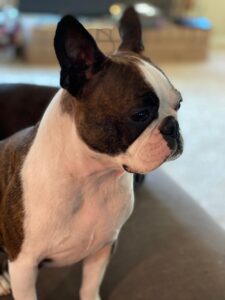Boston Terrier Health Issues
A deep love for this breed means that improving Boston Terrier health issues is in the forefront of our breeding program. Some issues are inherent in the breed and will be a struggle no matter the health of the dogs used in the breeding program. But other Boston Terrier health issues are avoidable if precautions are taken. Below are some things you need to know if you are considering the purchase of a Boston Terrier.
Boston Terrier Brachycephaly

All Boston Terriers have Brachycephaly. “Brachy” means short and “Cephalic” meaning head, so Boston Terrier Brachycephaly just indicates the health conditions associated with the cute smushy face of these dogs. They have flat noses and narrow airways. Because of the limited airflow, they are unable to regulate their temperature well. This can effect the length of time and how strenuously they exercise, especially in hot weather. Brachycephalic dogs also tend to snore, have noisy breathing and other issues related to their breed. Owners of Brachycephalic dogs should understand the risk. Despite our dedication as breeders, we cannot eliminate completely from our program the issues brachy dogs are prone to, and owners of these breeds must expect and prepare for these by maintaining good pet insurance and being ready to care for their dog’s Brachycephalic related health issues.
While these issues are inherent to the breed and all other Brachycephalic breeds, what we strive to prevent is BOAS (Brachycephalic Obstructive Airway Syndrome) Recent research debunks the theory that lengthening the nose in these breeds will prevent BOAS. THIS ARTICLE shows that the best indicator breeders can use as a guide to breeding dogs that have the best chance at clear airways is to select dogs with wider nares (nasal openings) in our breeding programs. This is one of the guidelines we use in our program in order to produce healthy puppies.
Breathing issues are not the only issues in Boston Terriers. Here are some other things to consider.
Boston Terrier Cherry Eye, JHC, and Other Eye Issues
Why are Bostons prone to eye issues?
Boston Terriers eyes are big and expressive! While they are cute, their eyes are quite prone to injury. Care should be taken to keep your Boston from injuring its eyes. Keeping a Boston Terriers eyes protected can mean keeping them from running through brush, getting sand in their eyes, and fighting with other dogs or cats who can injure the Boston terrier eye. Boston terrier cherry eye can happen when a Bostons eyes get injured. It is an inflamed third eyelid. It can be treated with steroids and drops and may shrink over time. You can also try massaging it back into place. Please use extreme caution if you decide to do this as if there is any debris left in the eye it can scratch the surface of the eye.
JHC (Juvenile Hereditary Cataracts) is a disease that affects young Boston Terriers, often leaving them blind before the age of 2. This disease should no longer be an issue in Bostons! There is a DNA test for this awful disease and most Canine Genetic companies will perform the test with a simple swab for under $40. If every breeder screened their dogs, the disease could be eradicated. Unfortunately there are backyard breeders and accidental breedings by people who do not care to, or are not educated enough to test their dogs. This is the minimum of testing that all breeders should do as it is the only “for sure” test we have for the conditions in our breed.
I can absolutely GUARANTEE that none of the puppies I produce will ever be affected by JHC. Other health conditions prevalent in the breed can be screened for but not guaranteed.
Deaf Boston Terrier?
Approximately 5% of Bostons are Deaf. That is a high percentage compared to most breeds! It is recommended that Boston Terrier puppies have a BAER test performed before they go home so it can be determined if they are unilaterally or bilaterally deaf.
A unilaterally deaf puppy has normal hearing in one ear and hearing loss in the other. In most dogs it is impossible to tell if there is unilateral deafness without the BAER test. That is because a puppy’s brain learns to interpret the sound it hears from one ear and begins compensate for directionality.
While some dogs with excessive white markings have been diagnosed as deaf, there are those with no excessive white that have also been diagnosed deaf. So just breeding for no excessive white on the face is no guarantee to eliminate deafness. There also have been many cases where 2 BAER tested clear parents have produced deaf puppies. Therefore, we do everything we can as breeders: only breed Dogs without excessive white and that are not unilaterally or bilaterally deaf. Unfortunately this is not a guarantee. We still BAER test all puppies coming from our program to give the new owners a clear picture of their puppy’s hearing and to prevent deaf puppies from going into a breeding program.

Boston Terrier Patellas
Boston Terriers do tend to have loose patellas as a breed. We OFA test our parents to prevent breeding dogs with moderate to severe patella issues. However this does not guarantee all puppies from our program will not develop patella luxation. While genetics can play a role in the health of a dog’s patellas, there is also a very strong environmental component. That is why we warn against running a dog before maturity, walking on slick or unstable flooring, and jumping off furniture. Joint nutritional supplementation from puppyhood may be a wise idea to increase thick joint synovial fluid as a cushion for the dog’s joints.
